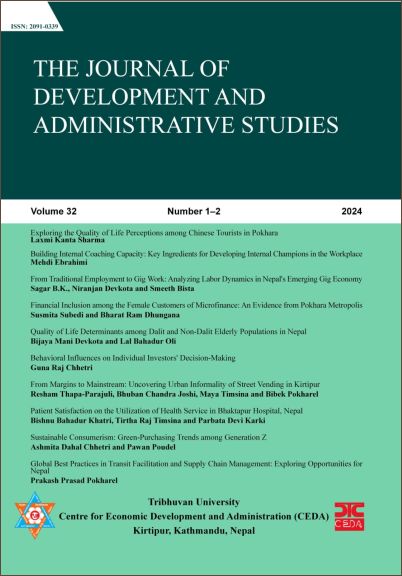Quality of Life Determinants among Dalit and Non-Dalit Elderly Populations in Nepal
DOI:
https://doi.org/10.3126/jodas.v32i1-2.75850Keywords:
Quality of Life (QoL), Aging, Dalit, Socio-economic disparities, Caste-based discriminationAbstract
This study examines socio-demographic and economic determinants regarding the quality of life (QoL) among Dalits and Non-Dalit in the elderly populations of Nepal, particularly in Palungtar Municipality, Gorkha District. It employs a descriptive and explanatory design, interviewing 430 individuals aged 60 and above. The major evidence found includes various disparities in QoL determinants, illiteracy among Dalits registered at 78.11 percent, whereas Non-Dalit had an illiteracy rate of 64.92 percent (χ² (2) = 8.7406, P = 0.000). This gap is even clear in terms of employment; the retired employee status is reported by only 1.8 percent of Dalits compared to 6.5 percent of Non-Dalit (χ² (1) = 5.1930, P = 0.023). The income group is alarming; around 72.7 percent of Non-Dalit earn more than Rs.500,000 in a year, as opposed to only 27.3 percent of Dalits (χ² (1) =8.67010, P=0.031). The logistic regression analysis yielded significant predictors of QoL with age found to be positively associated with QoL (β=0.129, p<0.01), which could indicate prospective adaptability among older adults. Literacy (β = -0.374, p < .01) and school education (β = -0.380, p < .05) are negatively related parameters, signifying the need for educational equity along the dimension. Employment (β = 0.569, p < .05) and income (β = -0.045, p < .05) contribute positively to QoL, while retirement (β = 1.282, p < .01) presents as a significant measure of determining one's experience of QoL. This study points to systemic inequities and calls for specific measures in education, equity in income, and inclusive policies to improve QoL in marginalized (Dalit) aging populations.
Downloads
Downloads
Published
How to Cite
Issue
Section
License
The copyright of the accepted articles is reserved by the Centre for Economic Development and Administration (CEDA), Tribhuvan University (TU). No part of the article published in this journal should be reproduced except provided by the law currently in force without the written consent of the centre.




